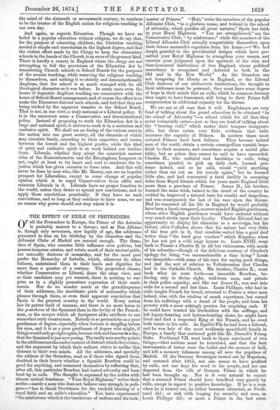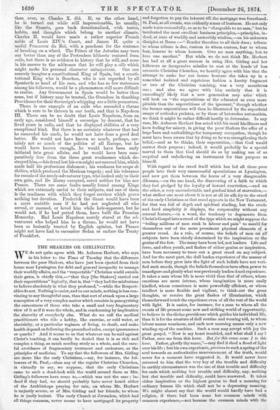THE E.F.t2CT OF EXILE ON PRETENDERS.
OF all the Pretenders in Europe, the Prince of the Asturias is probably nearest to a throne; and as Don Alfonso is, though only seventeen, now legally of age, the addresses presented to him on his birthday by the Grandees and the Alfonsist Clubs of Madrid are natural enough. The Gran- dees of Spain, who exercise little influence over politics, but possess immense estates, and retain much of their ancient pride, are naturally desirous of monarchy, and for the most part prefer the Monarchy of Isabella, which, whatever its other failures, maintained them in their lands and dignities for more than a quarter of a century. The propertied classes, whether Conservative or Liberal, share the same view, and as their candidate may yet succeed, there is nothing to sur- prise us in a slightly premature expression of their senti- ments. Nor do we wonder much at the grandiloquence of their addresses, the inordinate pride of nationality which gleams through them, or even their apparent conviction that Spain is the greatest country in the world. Every nation has its patent fault of manner, and there is no more harm in the grandezza of the Spaniard than in the levity of the French- man, or the morgue which all foreigners alike attribute to our somewhat surly countrymen. Nobody is so pretentious as a poor gentleman of degree, especially when fortune is dangling before his eyes, and it is as a poor gentleman of degree who might, if things would only go right again, become rich and famous in a day, that the Spaniard is just now posing. The really note worthy points in the addresses are the under-current of distrust which they evince, and the argument by which their authors strive to soothe this distrust to their own minds. All the addresses, and specially the address of the Grandees, read as if those who signed them doubted in their hearts whether a Spanish Bourbon could be good for anything, and reassured themselves by reflecting that, after all, this particular Bourbon had tasted adversity and been bred tip in exile. The thought is expressed by the nobles with almost cynical frankness. "Your Royal Highness," writes their scribe—surely a man who does not believe very strongly in pedi- gree—" has to thank Providence for the twofold blessing of a royal birth and an exile's education." You have experienced " the misfortune which is the touchstone of nations and the task- master of Princes." "Heir," write the members of the popular Alfonsist Club, "to a glorious name, and trained in the school of adversity, which purifies all great natures," Spain has faith in your Royal Highness. " You are strengthened," say the Conservative Club, " by misfortune;" while the members of the Liberal Alfonsist Club actually congratulate themselves upon their future monarch's expulsion from his home :—" We feel deeply grateful to the providential designs which have per- mitted your Royal Highness to strengthen your reason and exercise your judgment upon the spectacle of the wise and time-honoured institutions of free England, whose political ascendancy is recognised and deferred to both in the Old and in the New World." As the Grandees are not hungering for liberty as in England, or the Liberal Club desirous of our aristocratic institutions, the thought in their addresses must be personal; they must have some degree of hope in their minds that an exile, which in common decency they ought to have bemoaned, will bring to their Prince full compensation in additional capacity for the throne.
We are not at all sure that it will. Englishmen are very fond of talking about the grand education to be obtained "in the school of Adversity "—a school which for all that they never voluntarily enter—just as they are fond of talking about the " bracing cold," which makes their tempers insupport- able, but there exists very little evidence that exile increases the capacity of Princes. In modern times most restored Princes have been failures. They become indeed men of the world, obtain a certain cosmopolitan varnish bene- ficial to their manners, and sometimes acquire a useful plia- bility, but as rulers they cannot be said to have succeeded. Charles IL, who endured real hardships in exile, being sometimes puzzled to pick up daily cash, learned pru- dence indeed, and as he said, would "yield anything rather than set out on his travels again," but he learned little else, and had contracted a fatal facility in accepting doles from Royal friends which for years made England little more than a province of France. James II., his brother, learned the same trick, turned to the creed of the country he resided in, improved a natural taste for cruelty and despotism, and was consequently the last of his race upon the throne. Had he remained all his life in England he would probably have been a harsh-tempered, narrow-minded English gentleman, whom other English gentlemen would have endured without very much strain upon their loyalty. Charles Edward had no opportunity to display his character as a sovereign, but his history after Culloden shows that his nature had very little of the true grit in it, that sunshine suited him a good deal better than " the hard grey weather " which Kingsley, when he has not got a cold, sings hymns to. Louis XVIII. went back to France a Charles H. in all but viciousness, with much of his urbanity—though of the delicious courtesy of Charles's apology for being " so unconscionable a time dying " Louis was incapable—with some of his turn for saying good things, and just the sort of relation to Voltaireanism that Charles had to the Catholic Church. His brother, Charles X., went back what he went forth—an incurable Bourbon, be- lieving only in divine right, well-born men, and priests in their police capacity, and like our James H., was sent into exile for a second and last time. Louis Philippe, who had in exile taught French for bread, returned to France a wiser man indeed, wise with the wisdom of much experience, but cursed from his sufferings with a dread of the people, and from his poverty with a most unkingly passion for acquiring cash. If he could have trusted his freeholders with the suffrage, and left legacy-hunting and heiress-hunting alone, he might have lived and died a respected King of the French, and he owed both taints to his exile. As Egalite Fills he had been a Liberal, and he was heir of the most recklessly spendthrift family in Europe, a family that scattered gold like Mr. Disraeli's Young Duke. Ferdinand VII. went back to Spain convinced of two things,—that nations must be terrorised, and that the best instruments of terror were the bullet and the menace of hell, and left a memory infamous among all save the populace of Madrid. Of the German Sovereigns turned out by Napoleon, and restored after 1815, not one seems to have profited by exile, not one kept his word to his people, and not one departed from the ride of German Prince in which he had been brought up. Nor is it very natural to expect that a restored Prince should have benefited very greatly by exile, except in regard to positive knowledge. If he is a man when he is turned out, he either becomes ulcerated, as Ferdi- nand did ; or sick with longing for security and ease, as Louis Philippe did ; or more a Prince in the bad sense than ever, as Charles X. did. If, on the other hand, he is turned out while still impressionable, he usually, like the Stuarts, goes back denationalised, with tastes, habits, and thoughts which belong to another climate. Charles H. would have made a rather superior French noble of Louis XIV.'s Court, and James IL quite a useful Procureur du Boi, with a penchant for the sentence of breaking on a wheel. The Prince of the Asturias may turn out better than any of the Pretenders hitherto restored from exile, but there is no evidence in history that'he will, and none in his answer to the addresses that he will play a role which might make his personal character unimportant. One can scarcely imagine a constitutional King of Spain, but a consti- tutional King who is Bourbon, who is not regarded by all Spaniards as head of his race, and who has so few statesmen among his followers, would be a phenomenon still more difficult to realise. Any Government in Spain would be better than none, but if history may be trusted, the Grandees in thanking Providence for their Sovereign's whipping are a little premature.
There is one example of an exile who ascended a throne which is sure to be thrown in our teeth, and that is Napoleon DI. There can be no doubt that Louis Napoleon, from an early age, considered himself a sovereign by descent, that he lived years in exile, and that he displayed abilities of a very exceptional kind. But there is no certainty whatever that had he succeeded his uncle, he would not have done a good deal better. He would not have known so much, perhaps, cer- tainly not so much of the politics of all Europe, but he would have known enough, .he would have been early initiated into great affairs, and he would have been com- paratively free from the three great weaknesses which -de- stroyed him,—his dread lest his son might no tsucceed him, which made half his professions dishonest ; his weakness for coups de the'Otre, which produced the Mexican tragedy; and his tolerance for rascals of the needy-adventurer type, who looked only to their own gain, and De Morny excepted, cared neither for him nor France. There are some faults usually found among Kings which are extremely useful to their subjects, and one of them is the readiness with which they forget services which prove nothing but devotion. Frederick the Great would have been a more amiable man if he had not neglected all who served, or amused, or loved him while heir-apparent, but he would not, if he had petted them, have built the Prussian Monarchy. Had Louis Napoleon merely stared at the ad- venturers who helped him to a throne, he would not have been so leniently treated by English opinion, but France might not have had to encounter Sedan or endure the Treaty of Frankfort.



































 Previous page
Previous page